Microsoft Admits That Cortana Can’t Compete With Alexa, Google Assistant

Microsoft is taking its digital assistant Cortana in a new direction as it has fallen behind Google Assistant and Alexa in the past year, according to reports.
CEO Satya Nadella, while speaking to a group of journalists earlier this week, said that the hardware giant no longer views Cortana as a direct competitor to Alexa or Google Assistant.
“Cortana needs to be that skill for anybody who’s a Microsoft 365 subscriber,” he said, in reference to Microsoft’s recent push for consumer subscriptions. “You should be able to use it on Google Assistant, you should be able to use it on Alexa, just like how you use our apps on Android and iOS, so that’s at least how we want to think about where it’ll go.”
Microsoft and Amazon have already teamed up to integrate Alexa and Cortana. At the time, Nadella said assistants were like web browsers, and should be able to work within each other’s ecosystems to get the same kind of information.
This means that instead of going after the smart speaker market, Nadella sees Cortana as more of an app or a service, one that functions across multiple platforms. Nadella wanted to make Cortana “a valuable skill that somebody who is using Alexa can call.”
Cortana used to be in Microsoft’s AI research division, but the company moved the assistant into its Experiences and Devices team, signaling the change in goals for Cortana. Microsoft is currently in the process of changing Cortana’s position on Windows 10 as well, separating it from search and silencing it during setup.
Recently, Microsoft has also been dealing with security issues. Last month, Microsoft had to issue an emergency security update for Internet Explorer after hackers exploited a new flaw in a few different versions of the browser.
“A remote code execution vulnerability exists in the way that the scripting engine handles objects in memory in Internet Explorer,” the company revealed in a statement. “The vulnerability could corrupt memory in such a way that an attacker could execute arbitrary code in the context of the current user. An attacker who successfully exploited the vulnerability could gain the same user rights as the current user. If the current user is logged on with administrative user rights, an attacker who successfully exploited the vulnerability could take control of an affected system. An attacker could then install programs; view, change or delete data; or create new accounts with full user rights.”
